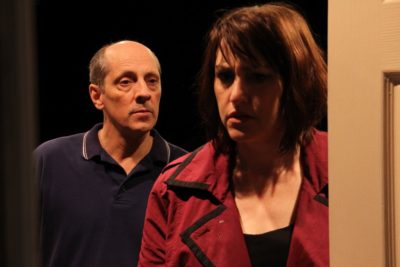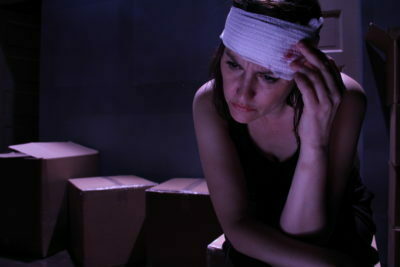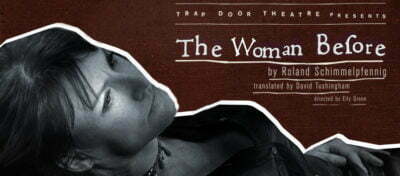The Woman Before
Translated by David Tushingham
Directed by Elly Green
Produced by Trap Door Theatre, Chicago
Trap Door’s Strong Production Helps Compensate for Script
German writer Roland Schimmelpfennig’s 2004 play The Woman Before is a dark fantasy about the worst possible results of jealousy and clinging to the past. It’s a universal theme, and under the direction of Elly Green, the actors at Trap Door bring to life the full measure of guilt, confusion, and defensiveness that come with the territory of past relationships resurfacing in the present. However, there are two problems with Schimmelpfennig’s approach: one is that this is another play that occurs non-chronologically, mainly, I suspect, out of a desire to appear more complex than it is. The other is that one side of the love triangle really has no claim to her object of affection whatsoever, so instead of a tragic conflict, we simply have the story of a complete lunatic showing up one day to harass and terrify innocent people.
The lunatic in question is Romy Vogtlaender (Shawna Franks), a woman in her mid-forties who one day shows up at the door of the apartment where Frank (Kirk Anderson) and Claudia (Loretta Rezos) live with their son, Andi (Adam Marcantoni). She politely, but firmly, declares her intentions: twenty-six years ago, during a summer-long relationship when they were teenagers, Frank vowed to always love her. Now she’s come back, so she’ll be leaving with Frank. Indeed, she is surprised to learn he has married, but is sure it won’t be a problem. For his part, Frank is astounded, and has difficulty remembering her. Claudia demands Romy leave immediately. Genuinely shocked, Romy is pushed out, vowing to return later, but she doesn’t have much time, because it just so happens that the family was planning on moving out the next day. Most of their things are already in boxes.

Meanwhile, Andi is spending his last night with his girlfriend, Tina (Leslie Ruettinger). We learn this mostly through direct-address from Tina, including that when they saw Romy leaving the apartment, they spontaneously started throwing rocks at her, and one thrown by Andi hit her on the head. In a panic, Andi brings her upstairs, where Frank confirms that she’s still alive, but now, they’ve got her back in the house. Relieved, Andi returns to Tina, and during their eventful night, he swears to always love her. Romy finds her own ways of making trouble, like by persuading Frank that they have both led very boring lives since their break-up, and theoretically might have been better off had they remained together. But first, through a time shift, we see her seduce Andi following his return later that night.
The actors all give solid performances. Shawna Franks as Romy isn’t overtly neurotic or murderous; she just seems willfully oblivious to the absurdity of what she is demanding. It’s Rezos’s Claudia who shows much more hostility toward Frank, which isn’t really justified, and pushes Frank towards Romy in a clear playwright’s contrivance. As Frank, Anderson is mostly confused and exasperated. Ruettiger is almost always addressing the audience from some corner of the theatre which director Elly Green stuck her in, in accordance with Schimmelpfennig’s script, and pours a lot of passion into her character’s sorrow over her forced separation from her boyfriend, but joy at how they enraged her disapproving father. The implication is obviously that she’s supposed to potentially be another Romy in the making, but I don’t really see it. My favorite performance was Marcantoni’s, who captures brilliantly the mannerisms of sweet, but wayward youth. During one long monologue in which he describes Andi’s love for Tina, Marcantoni plays up Andi’s verbal awkwardness, which he compensates for by gushing out visually descriptive language, in which he compares Tina to a pastoral painting of a forest. It’s a lovely humanizing moment in a play which has been billed as a “dark farce.”

Reviews of past performances have compared this play to Harold Pinter’s Old Times, which is true to some degree, but misses the point that there’s nothing in Frank and Romy’s past which would form the basis of a relationship, only an imaginary future which is impossible due to Andi’s existence. Green is able to keep most of the time shifts comprehensible with the aid of projections and repeating actions, and there is some degree of tension built up through the strategic placement of certain boxes. A revelation about Romy at the play’s conclusion was only foreshadowed in the vaguest, most easily missed way, and if not for a superficial similarity to another famous theatrical character, would seem inexplicable. As it is, this is basically a horror story with some weird humor thrown in. The strength of the production will probably maintain the attention of most audience members, but the story’s structure is an unnecessary impediment.
Somewhat Recommended
Jacob Davis
3jacob.davis@gmail.com
This show has been Jeff recommended.
For more information, see The Woman Before’s page on Theatre in Chicago.
Playing at Trap Door Theatre, 1655 W Cortland Ave, Chicago. Tickets are $20-25; to order, call 773-384-0494 or visit www.trapdoortheatre.com. Runs Thursdays, Fridays, and Saturdays at 8:00 pm and Sundays at 7:00 pm through June 13. Running time is ninety minutes, with one intermission.

